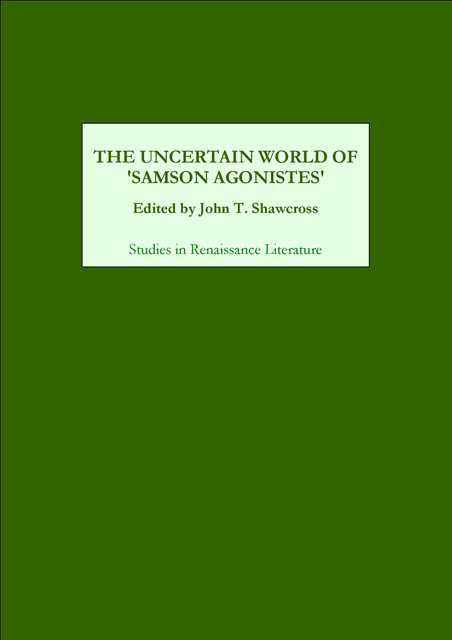Book contents
- Frontmatter
- Contents
- Preface
- Chapter 1 The World of Samson Agonistes
- Chapter 2 Uncertainty and the Text
- Chapter 3 The Dramatic Work and its Reading
- Chapter 4 Samson: God’s Champion, a Type, or Individual?
- Chapter 5 Dalila: Seductress or Wife?
- Chapter 6 Politics in the Destabilized Text
- Chapter 7 Biographical Intrusions
- Chapter 8 The Uncertainties of Irony
- Chapter 9 A Hermeneutics of the Text
- Chapter 10 Samson Agonistes and Consistencies of Belief
- Works Cited
- Index
Chapter 6 - Politics in the Destabilized Text
Published online by Cambridge University Press: 22 March 2023
- Frontmatter
- Contents
- Preface
- Chapter 1 The World of Samson Agonistes
- Chapter 2 Uncertainty and the Text
- Chapter 3 The Dramatic Work and its Reading
- Chapter 4 Samson: God’s Champion, a Type, or Individual?
- Chapter 5 Dalila: Seductress or Wife?
- Chapter 6 Politics in the Destabilized Text
- Chapter 7 Biographical Intrusions
- Chapter 8 The Uncertainties of Irony
- Chapter 9 A Hermeneutics of the Text
- Chapter 10 Samson Agonistes and Consistencies of Belief
- Works Cited
- Index
Summary
EVE is not a seductress, of course, although Adam is seduced by her female charms; she is not fraudulent, not even after the Fall when she believes that she has taken on Wisdom and Godliness, and though she is acting as Satan is hopeful she will, she is not consciously his agent. She is woman and she is wife; and she becomes an exemplar of sincere repentance. Eve and Dalila seem not to have certain qualities in common, and certainly do not have others in common. They cannot be put together in a generality without clear specifications of person and circumstance, neither as woman nor as wife. (Compare Bennett’s and Revard’s articles noted before on concepts of Woman and on linking of Eve and Dalila.) Eve as wife works with her husband, has her own activities and responsibilities, is companion and helpmate, exercises her own mind, argues its reasoning, and makes her own choices. Adam as masculine being takes on certain activities and responsibilities better demanding strength, and Eve as feminine being takes on certain activities and responsibilities not requiring so much strength. This can be seen in their differing gardening activities, for example. A similar division of activity is seen in Adam’s naming the animals and Eve’s naming the flowers (naming ability being assigned to humankind in Milton, not simply to the male as in the Bible). Beneath this is an implication of the activity of animals and the passivity and beauty of flowers, with engendering overtones. Milton separates man and woman through various gendering descriptions and associations, even though today many people minimize (and even try to eliminate) such separations. The difference in the physicality of sexual parts is too obvious and inadequate as an explanation of genderfication in culture. Milton, though we do not like the stereotyping, offers some explanation. On the other hand, we see no wifely qualities in Dalila other than sexual partner and, if we accept her as being sincere, concern now for her husband’s plight. Her repentance and what might have been its results had Samson credited it are quite different from Eve’s.
The concept of Eve and Dalila as Woman in Milton’s poems must be placed in relation to Adam and Samson.
- Type
- Chapter
- Information
- The Uncertain World of Samson Agonistes , pp. 81 - 91Publisher: Boydell & BrewerPrint publication year: 2001

